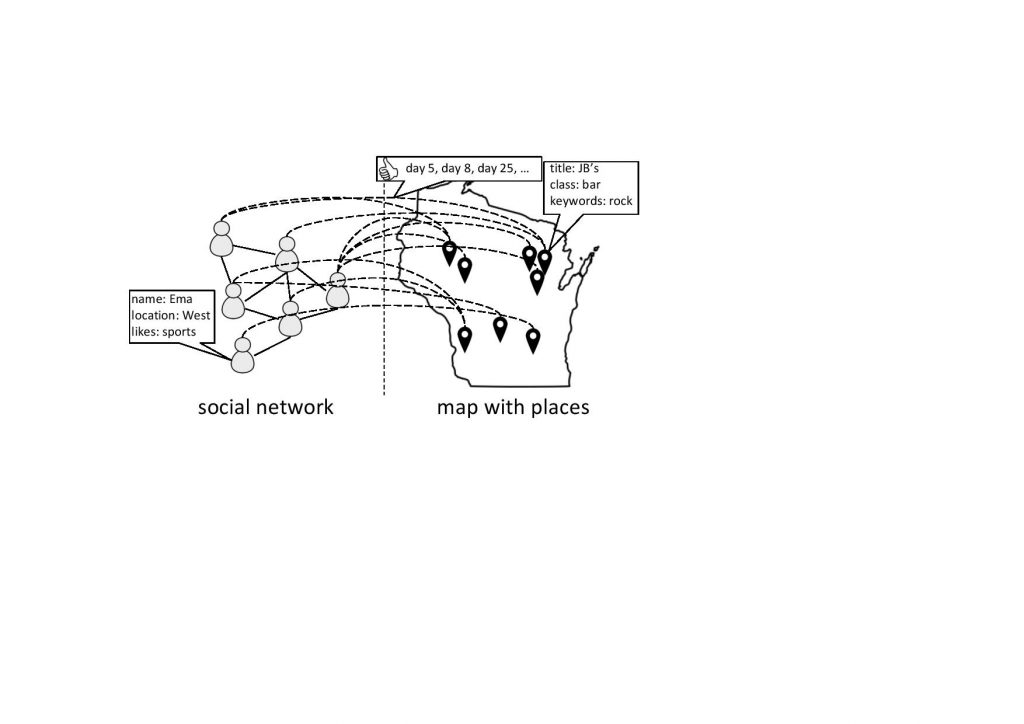

Recommender systems have become a standard for suggesting items that are of potential interest to users. For example, Amazon has a product recommendation module, Netflix recommends TV series to customers, Yelp suggests restaurants to users. Our group has been studying the problem of location (or venue) recommendation to individual users or groups thereof. In [1], we considered users of location-based social networks (e.g. Foursquare) who share their check-ins to places of interest. We propose algorithms that generate recommendations to users based on four factors: a) past user behavior (visited places), b) the location of each venue, c) the social relationships among the users, and d) the similarity between users. The aggregation of multiple recommenders in improving the quality of location recommendations was studied in [5]. Another direction of interest is the problem of recommending an item (or a set of items) to a group of users. Towards this direction, in [7] we improved the efficiency of fault-tolerant group recommendation suggested in previous work by modeling the fault-tolerant subspace clustering problem as a search problem on graphs. In [4], we studied the problem of recommending a venue to a group of users; to this end, we proposed a hierarchical Bayesian model which considers the mobility behaviors of group users together with their latent preferences and uses data from a location-based social network. In another work [6], we studied a meeting point recommendation problem for a set of users, whose preferences are not explicitly given, but they are inferred by their past location visits. The goal is to minimize the traveling distance required by all users to meet at the suggested venue, while maximizing the group’s aggregated preference to the venue. In [2,3,8], we studied the problem of recommending a set (package) of items or venues to a group of users with an emphasis in fairness; the objective is that the recommended packages are fair with respect to the preferences of all group members. The novel consideration of fairness requires that no user is consistently slighted by the item selection in the package. Applications include recommending vacation packages to tourist groups, entertainment packages to groups of friends, or sets of courses to groups of students. We propose probabilistic models that capture the preference of a group towards a package, incorporating factors such as user impact and package viability.
[1] H. Wang, M. Terrovitis, and N. Mamoulis, «Location Recommendation in Location-based Social Networks using User Check-in Data,» Proceedings of the 21st ACM SIGSPATIAL International Conference on Advances in Geographic Information Systems (GIS), pp. 364-373, Orlando, FL, November 2013.
[2] S. Qi, N. Mamoulis, E. Pitoura, and P. Tsaparas, «Recommending Packages to Groups,» Proceedings of the IEEE International Conference on Data Mining (ICDM), pp. 449-458, Barcelona, Spain, December 2016.
[3] D. Serbos, S. Qi, N. Mamoulis, E. Pitoura, and P. Tsaparas, «Fairness in Package-to-Group Recommendations,» Proceedings of the 26th International World Wide Web Conference (WWW), pp. 371-379, Perth, Australia, April 2017.
[4] Z. Lu, H. Li, N. Mamoulis, and D. W. Cheung, «HBGG: a Hierarchical Bayesian Geographical Model for Group Recommendation,» Proceedings of the SIAM International Conference on Data Mining (SDM), pp. 372-380, Houston, TX, April 2017.
[5] Z. Lu, H. Wang, N. Mamoulis, W. Tu, and D. W. Cheung, «Personalized Location Recommendation by Aggregating Multiple Recommenders in Diversity,» Geoinformatica, 21(3): 459-484, July 2017.
[6] Y. Qian, Z. Lu, N. Mamoulis, and D. W. Cheung, «P-LAG: Location-aware Group Recommendation for Passive Users,» Proceedings of the 15th International Symposium on Spatial and Temporal Databases (SSTD), pp. 242-259, Arlington VA, August 2017.
[7] D. Ding, H. Li, Z. Huang, and N. Mamoulis, «Efficient Fault-Tolerant Group Recommendation Using alpha-beta-core,» Proceedings of the ACM Conference on Information and Knowledge Management (CIKM), pp. 2047-2050, Singapore, November 2017 (short paper).
[8] S. Qi, N. Mamoulis, E. Pitoura, and P. Tsaparas, «Recommending Packages with Validity Constraints to Groups of Users,» Knowledge and Information Systems (KAIS), 54(2): 345-374, February 2018.